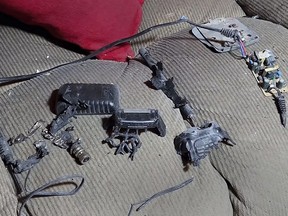What we know about the attack as new explosions this time with walkie-talkies rock Beirut and Lebanon

Hezbollah, Lebanon and Iran have blamed the operation on Israel, an assessment confirmed by U.S. officials. However, Israel has not confirmed or denied responsibility.
The pager attack began when the units started heating up and then exploding in their owners’ hands or pockets, leaving blood-splattered scenes and panicking bystanders. The attack affected pagers that were switched on and receiving messages.
Officials and analysts said the pagers appear to have been tampered with before they made it into the hands of Hezbollah members.
Israel is alleged to have hidden tiny explosives inside a batch of Taiwanese-branded pagers imported to Lebanon. The explosive material, as little as one to two ounces, was implanted next to the battery in each pager, according to American officials briefed on the operation. A switch was also embedded that could be triggered remotely to detonate the explosives, reports the Times.
A third party would be necessitated by Lebanon facing a range of sanctions from the United States, the European Union and their Western partners. Additionally, the U.S., United Kingdom and their allies, such as Japan, list Hezbollah as a “terrorist” organization. That means companies registered in these countries, or trading with them, are wary of transactions, especially dealing in technology, with Hezbollah or Lebanon.

Officials said that Hezbollah ordered more than 3,000 pagers, distributing them not just to fighters, but also to rank-and-file members across Lebanon and in Syria and Iran. It is not clear when the pagers were ordered or when they arrived in Lebanon, reports the Times.
Hezbollah’s reliance on pagers increased after the October 7 attacks on Israel, when its leader warned that Israeli intelligence had penetrated the cellphone network, according to security experts. Analysts said that in trying to guard against one vulnerability, Hezbollah had opened itself to another fatal attack.
The AR-924 pagers used in Tuesday’s attack were manufactured by BAC Consulting KFT, which is based in the Hungarian capital, Budapest, according to a statement released by Gold Apollo, a Taiwanese firm that authorized the use of its brand on the pagers. BAC appears to be a shell company.
“According to the cooperation agreement, we authorize BAC to use our brand trademark for product sales in designated regions, but the design and manufacturing of the products are solely the responsibility of BAC,” Gold Apollo said in its statement. The company’s chair, Hsu Ching-kuang, told journalists Wednesday that the firm has had a licensing agreement with BAC for the past three years.
BAC Consulting Kft is a limited liability company, registered in May 2022, according to company records. At the headquarters in a residential neighborhood of Budapest, the names of multiple companies, including BAC Consulting, were posted on pieces of paper in a window, AP reports.

Taiwan’s Ministry of Economic Affairs said from the beginning of 2022 until August 2024, Gold Apollo has exported 260,000 sets of pagers, including more than 40,000 sets between January and August of this year. The ministry said that it had no records of direct exports of Gold Apollo pagers to Lebanon.
The sophisticated, apparently remote attack renewed fears that the Israel-Hamas war in Gaza could spill into a wider regional conflict.
Hezbollah is a Hamas ally and has exchanged fire with Israeli forces almost daily since the October 2023 Hamas attack in southern Israel. Since then, hundreds have been killed in the strikes in Lebanon and dozens in Israel, while tens of thousands on each side of the border have been displaced.
Hezbollah and Israel have carefully avoided an all-out war, but Israeli leaders have issued a series of warnings in recent weeks that they might increase operations against Hezbollah in Lebanon. Israel began moving more troops to its border with Lebanon on Wednesday as a precautionary measure, according to an official with knowledge of the movements.
Hezbollah said in a statement Wednesday morning that it would continue its normal strikes against Israel, separate from a “reckoning that the criminal enemy must await for its massacre on Tuesday.”
Our website is the place for the latest breaking news, exclusive scoops, longreads and provocative commentary. Please bookmark nationalpost.com and sign up for our daily newsletter, Posted, here.